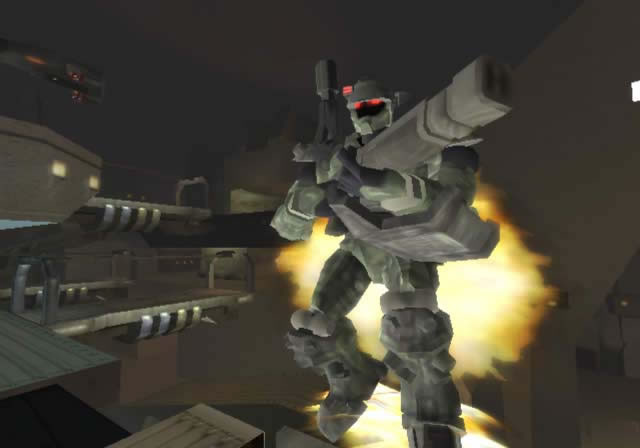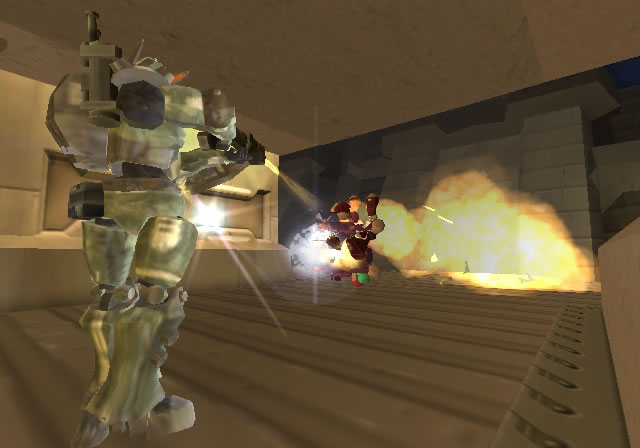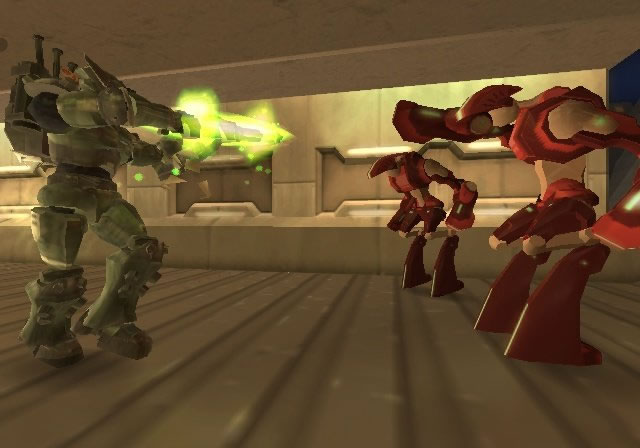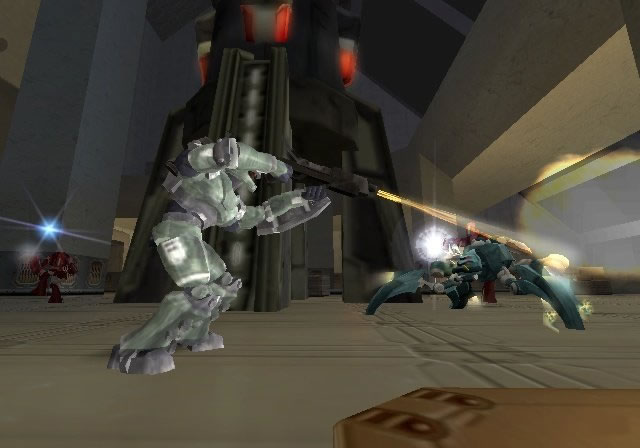I was very excited when I heard that Sega was bringing back a few of its Genesis franchises for the PlayStation 2. Along with a new incarnation of Altered Beast, it also decided to give VectorMan a new lease on life. Unfortunately, our hero forgot to read the “proprietor has the right to cancel at any time” clause in said lease. The game was canned early in development and VectorMan was sent back to the end of the huge line of Sega properties awaiting another chance to shine.
It seems odd that such an unfair end would come to a character that had been nothing but hailed in both his initial outing and successful sequel. In fact, were we to go by common sense and appeal, Altered Beast should have been the one to get the axe, especially after that mediocre snorefest released on the Game Boy Advance. No, it would be another established franchise, this one a true fan favorite, that would never see the light of day.
A Bit of History
 Not familiar with Vectorman? Shame on you! Let me give you the scoop then. His is a story mired in tragedy and bound by fate. Tragedy as in the Genesis original being one of the last real efforts on the system and fate as in the huge 32-bit vacuum that sucked away all his momentum. The ol’ boy never really had a chance. Making your debut during a console’s twilight is never a good thing and poor VectorMan made that fatal mistake. Developed by Blue Sky Software (makers of the awesome World Series Baseball games) and released the same year the Genesis was officially discontinued in the U.S. (1995), the game went largely unnoticed by consumers, as most gamers had given up on Sega-s 16-bit wonder and were ready to move on to the Saturn and PlayStation. Though widely acclaimed by critics and hailed as a graphical tour de force, the game never really took off as hoped. It did sell well enough to warrant a sequel, which came out in 1996 and made virtually no commercial impact, save for a dull thud. Sporting more of the same intense action and better graphics, the game had everything a fan could want but was, as they say, “a day late and a dollar short.”
Not familiar with Vectorman? Shame on you! Let me give you the scoop then. His is a story mired in tragedy and bound by fate. Tragedy as in the Genesis original being one of the last real efforts on the system and fate as in the huge 32-bit vacuum that sucked away all his momentum. The ol’ boy never really had a chance. Making your debut during a console’s twilight is never a good thing and poor VectorMan made that fatal mistake. Developed by Blue Sky Software (makers of the awesome World Series Baseball games) and released the same year the Genesis was officially discontinued in the U.S. (1995), the game went largely unnoticed by consumers, as most gamers had given up on Sega-s 16-bit wonder and were ready to move on to the Saturn and PlayStation. Though widely acclaimed by critics and hailed as a graphical tour de force, the game never really took off as hoped. It did sell well enough to warrant a sequel, which came out in 1996 and made virtually no commercial impact, save for a dull thud. Sporting more of the same intense action and better graphics, the game had everything a fan could want but was, as they say, “a day late and a dollar short.”
Why didn’t either game do well? Well, we have Sega’s insane marketing to thank for that. Remember, this was the same company that had completely neglected to push such AAA titles like Gunstar Heroes and Ristar, since Sega of Japan had deemed that the 16-bit market wasn’t worth maintaining. A whole slew of quality Mega Drive releases were left behind in Japan, such as Pulseman, Monster World IV, and Alien Soldier. Sega instead felt the Saturn was now its only priority and only barely pushed Blue Sky’s creation; a decision that ended up costing the company huge profits in addition to giving the entire market to Nintendo. VectorMan disappeared as a franchise, despite a tepid attempt at promotion in the form of a contest where selected cartridges would win their owners $25,000.
A Ray of Hope
Sometime in 2002, Pseudo Interactive (Cel Damage for Xbox & PS2) approached Sega with a demo for a new VectorMan game. Sega was impressed with the Smash TV-style gameplay and fully immersive 3D world. Management liked what it saw and decided in April 2003 to green light the project. Not many games make a successful jump from 2D to 3D, but Sega felt VectorMan would be able to do so. Both the entire game world and even the main character were completely overhauled. The floating green balls that composed VectorMan‘s body were replaced with a hulking armor visage that was bathed in weaponry. Supposedly, the change in design is owed to VM having been defeated at some point in the past and sent to the scrap heap, only to be rescued by a secret someone. Discovering this mystery person was to become a focal point of the game’s storyline.
Click for larger images!
Product manager Chord Smith summed up the changes to the character and his world:
We’re moving away from a kiddy world, a funny low-key game from the past that served gamers well like six years ago. Gamers are now more sophisticated and serious, more intelligent. I think that people are looking forward to something different than what VectorMan was then. I feel like they want a darker, more deadly, kick-ass game. VectorMan, in this game, is a walking arsenal with attitude and style all his own. This game takes itself — the character, the level design, and the entire set of gameplay elements — more seriously than VectorMan of the past.
According to IGN, the gameplay was very intuitive and fluid. There were also destructible environments – about 80% of the total, in fact. As development proceeded, the whole scope of the game changed. By E3 2003, the game was set to be mostly an action title with some platforming elements. There were tons of weapons to use (fifteen in all with more than twenty-five upgrades), a booster rocket and grappling hook for reaching high places (great for blasting unsuspecting enemies), VectorMan‘s trademark morphing abilities, and an incredible physics engine that made each and every explosion seem real and vibrant. There was still quite a bit to do, such as implement a two-player cooperative mode, but what was shown (about 30%) looked like it had a world of potential and would definitely have been a game worth looking into. It was set to be finished up and running at 60fps, just in time for its Q1 2004 release as a PlayStation 2 exclusive.
Click for larger images!
All Hope Dashed
With all the excitement surrounding the new game and favorable impressions from journalists, it looked like VectorMan was set for a major comeback. Unfortunately, it was not to be. In November 2003, Sega quietly cancelled development. Though it never officially gave a reason for discontinuing the project, I bet it had something to do with VectorMan‘s limited recognition. It has been almost a decade since his last appearance, and Sega probably thought that too few gamers would remember the franchise. This can, of course, be counter-argued with the fact that the House of Sonic decided to revive Altered Beast, a series that made just a single console appearance almost fifteen years ago.
It may also have been that the game wasn’t turning out the way Sega wanted. Though all previews from game sites and magazines point to the contrary, Sega may have become disenchanted with VectorMan‘s progress. The sad truth is that we may never know.
Why not decide for yourself? Head over to our YouTube page and check out the video of what could have been.
Sources
- Perry, Douglass, C. “Hands-on Vectorman.” IGN, May 7, 2003.
- Vectorman Preview. The Magic Box, May 13, 2003.
- Varanini, Giancarlo. “Vectorman Impressions.” GameSpot, May 12, 2003.





Recent Comments